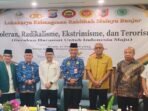Samarinda – Yuliana Wetuq, coordinator of the Petquk Mehuey forest guardian group from East Kalimantan Province’s East Kutai District, was elated after discussing the group’s efforts in preserving forest ecosystems.
“Long live nature!” Wetuq affirmed following the discussion.
Along with her nine like-minded comrades, Wetuq has been maintaining the sustainability of a local forest for 11 years since 2013. She stated that Petquk Mehuey was formed by its members’ awareness of the fact that Indonesia’s Kalimantan Island serves as part of the lungs of planet Earth. Their objective is to ensure environmental balance by protecting forests from potential threats.
The forest guardians have been safeguarding forest areas spanning around 38 thousand hectares stretching along the districts of East Kutai and Berau. In total, Kalimantan Island is home to as much as 40.8 million hectares of forest areas, storing an abundance of oxygen and carbon dioxide.
It is paramount to take continued measures for protecting Kalimantan’s forests to prevent deforestation that might weaken the functions of such areas. Wetuq’s forest guardian group has been collaborating with traditional institutions and rural administrations to ensure the sustainability of forests.
In its operations, the Petquk Mehuey group has been routinely deploying three to four personnel to enter and oversee forest areas in a four- to five-day shift. During a shift, the guardians bring essential tools and consumables to monitor the areas and survive the environment while awaiting fellow forest rangers to replace them for the next shift.
The guardians have voluntarily tasked themselves with protecting the forest and its biodiversity from irresponsible hunters and loggers. To fulfill their task, the group members usually monitor the forest on foot as well as aboard motorbikes. The on-foot venture is chosen to get through zones where a motorbike is unable to ply.
Moreover, the forest guardians have always been taking notes on important events they encounter during their patrols, including the finding of medicinal herbs that they had never seen before, the daily distance traveled, areas covered, as well as hunters and loggers they spotted.
Wetuq stated that during their patrols, the guardians frequently encounter various wild animals, such as bears, orangutans, deer, clouded leopards, and hornbills. However, she said that the group has not spotted any wild boars since 2020 for unknown reasons.
According to Wetuq, a permit from a local traditional institution is required for people seeking to gather resources stored by the forest, such as ratan, medicinal herbs, and honey. Customary sanctions and penalties will be imposed on those harvesting without a permit.
Moreover, people are only allowed to collect moderate amounts of resources that are sufficient for meeting the needs of their families. Such rules have been applied for the sake of the forest’s sustainability.
Members of Petquk Mehuay have been devoting themselves to the protection of the forest in the hopes of providing numerous people with adequate supplies of clean water, oxygen, and carbon.
Forest Carbon Funds
The forest defenders do deserve some appreciation for their sacrifices and dedication to the protection of the environment. In this context, they hope to be able to derive benefits from the value gained from carbon trade activities, considering that they have been working voluntarily to ensure sufficient supply of oxygen for people.
Petquk Mehuay is one among plenty of similar groups operating from 83 villages scattered across East Kutai District. The East Kalimantan provincial government has issued a letter regarding the distribution of Rp25.33 billion (US$1.6 million) funds allocated for East Kutai from the Forest Carbon Partnership Facility Carbon Fund (FCPF-FC). Hence, each village will receive around Rp305 million (US$19.5 thousand).
Moreover, funding totaling Rp2.18 billion (US$139 thousand) has also been prepared to award 26 village governments for their respective efforts in preserving forests and suppressing carbon emissions.
The funds, expected to be disbursed this year, will not only be presented to forest protector teams but also to various rural institutions. Petkuq Mehuay forest guardians are planning to spend the funds on tools and consumables essentials for patrolling, such as oil fuel.
The forest guardians hope that the World Bank and related international donor institutions would soon disburse the expected carbon forest funds, so they will be able to further step up their efforts in protecting the lungs of the Earth.
It should be noted that with or without the funds, the forest guardians and traditional communities will continue to safeguard forests, protecting them from illegal hunters and loggers.
Petkuq Mehuay’s 11 years of voluntary services have helped people preserve forests and protect biodiversity, enabling them to reap benefits from resources offered by forests covering East Kalimantan, the province that is projected to host Indonesia’s future capital city Nusantara.
anangfadhilah/ant








